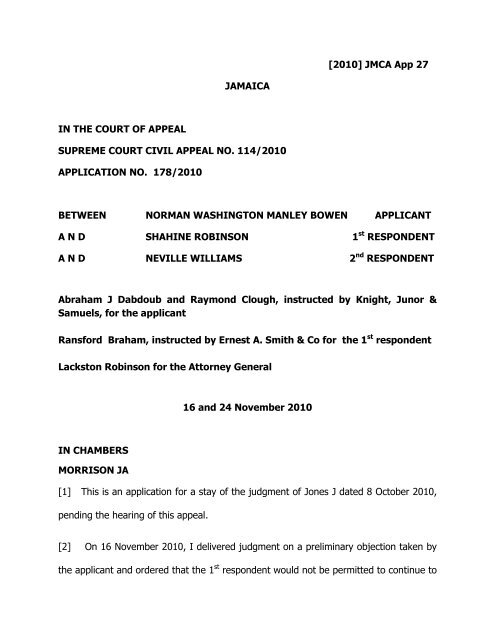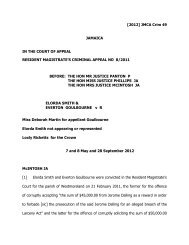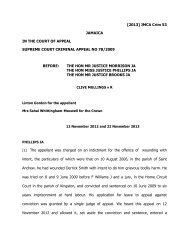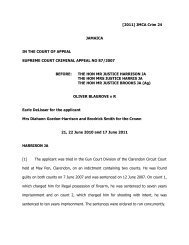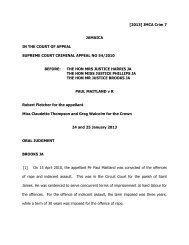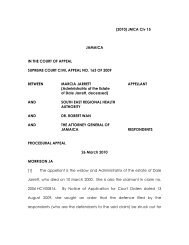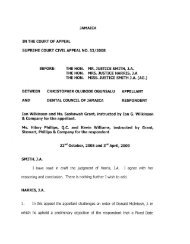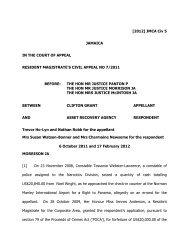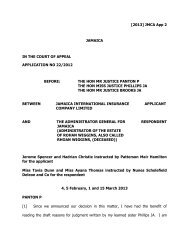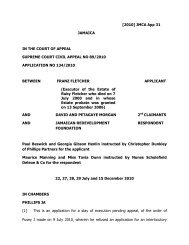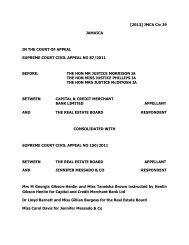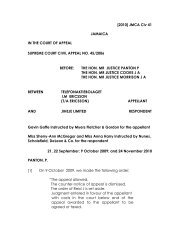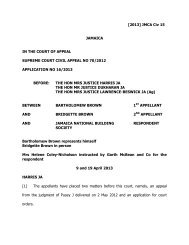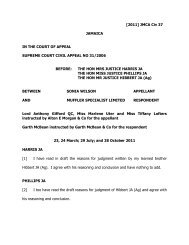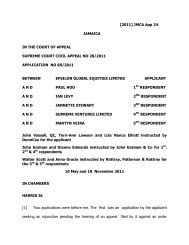Bowen _Norman_ v Robinson _Shahine_ and Williams _Neville_.pdf
Bowen _Norman_ v Robinson _Shahine_ and Williams _Neville_.pdf
Bowen _Norman_ v Robinson _Shahine_ and Williams _Neville_.pdf
Create successful ePaper yourself
Turn your PDF publications into a flip-book with our unique Google optimized e-Paper software.
[2010] JMCA App 27JAMAICAIN THE COURT OF APPEALSUPREME COURT CIVIL APPEAL NO. 114/2010APPLICATION NO. 178/2010BETWEEN NORMAN WASHINGTON MANLEY BOWEN APPLICANTA N D SHAHINE ROBINSON 1 st RESPONDENTA N D NEVILLE WILLIAMS 2 nd RESPONDENTAbraham J Dabdoub <strong>and</strong> Raymond Clough, instructed by Knight, Junor &Samuels, for the applicantRansford Braham, instructed by Ernest A. Smith & Co for the 1 st respondentLackston <strong>Robinson</strong> for the Attorney General16 <strong>and</strong> 24 November 2010IN CHAMBERSMORRISON JA[1] This is an application for a stay of the judgment of Jones J dated 8 October 2010,pending the hearing of this appeal.[2] On 16 November 2010, I delivered judgment on a preliminary objection taken bythe applicant <strong>and</strong> ordered that the 1 st respondent would not be permitted to continue to
appear or to act as a party against the petition, although she remained a respondent inthe proceedings. As a consequence of this ruling, the 1 st respondent, althoughrepresented by counsel (who were present at all times), has taken no part in thehearing of the substantive application.[3] In my judgment on the preliminary objection I outlined briefly the background tothis application <strong>and</strong> I do not propose to repeat it here. The grounds of the appealagainst Jones J’s judgment are as follows:(a)(b)(c)That in arriving at his decision the learned judge erred in notconsidering the facts set out in the affidavit of the claimant whichwas the only evidence properly before him <strong>and</strong> in failing to do sothe judge erred in not declaring Oswest Senior-Smith the dulyelected Member of Parliament for the constituency of Saint AnnNorth Eastern.That the learned judge erred in making his decision declaring theseat vacant without affording the claimant <strong>and</strong>/or his attorneys-atlawthe opportunity to address him on the question as to whetherby law <strong>and</strong> based on the evidence before him Mr Senior-Smithshould have been returned as the duly elected member of theHouse of Representatives for the constituency of Saint Ann NorthEastern.That the learned judge erred in declaring the seat vacant as helacked the jurisdiction as an application to substitute a respondentwas filed <strong>and</strong> served on the claimant’s attorneys-at-law on 1October 2010, well within the 14 days stipulated by section 15 ofthe Election Petitions Act, by one <strong>Neville</strong> <strong>Williams</strong>.[4] On the application now before the court, the applicant now seeks an order “thatthe Judgment of the Honourable Mr. Justice Roy Jones delivered on the 8 thday of
October 2010 be stayed pending the hearing of this Appeal”.The application issupported by an affidavit sworn to on 11 October 2010 by Mr Raymond Clough, who isa member of the applicant’s legal team. In that affidavit Mr Clough, after outlining thecontents of the applicant’s election petition <strong>and</strong> the circumstances in which the 1 strespondent came to file notice of her intention not to oppose the petition, states asfollows:“8. That on the 1 st day of October 2010 Messrs Kent Gammon &Co. acting on behalf of one <strong>Neville</strong> <strong>Williams</strong>, filed in theSupreme Court a Notice of Application to be substituted asa Respondent <strong>and</strong> the said Notice together with the Affidavitin Support was duly served on the Claimant’s Attorneys-at-Law on the 1 st day of October 2010 at 3:20 pm.9. That on the 4 th day of October 2010, upon the petitioncoming on for hearing before His Lordship Justice Mr RoyJones, Mr Kent Gammon attempted to make the applicationfor Mr <strong>Neville</strong> <strong>Williams</strong> to be substituted as a Respondentbut his Lordship advised that he had no such applicationbefore him <strong>and</strong> had not seen any such application. HisLordship further stated that the only application he wasprepared to deal with on that day was the application forindemnity costs.10. That after hearing the Claimant’s Counsel <strong>and</strong> the 1 stdefendant’s Counsel on the application for indemnity costshis Lordship reserved his decision <strong>and</strong> indicated that theNotice of Intention not to oppose the Election petition waspublished in the Jamaica Gazette on the 23 rd day ofSeptember 2010 <strong>and</strong> accordingly the 14 days had not yetexpired whereby he could deal with the determination ofthe seat. The Court was adjourned to the 8 th day ofOctober 2010.11. That on the 8 th day of October 2010, on attendance atCourt, the Learned judge proceeded to h<strong>and</strong> down a writtenJudgment which included a determination declaring the seatvacant. Counsel for the Claimant indicated that Claimantwas not afforded the opportunity to make submissions in
elation to whether or not Mr Oswest Senior Smith ought tobe declared the duly elected Member of Parliament. HisLordship indicated that as he had already made a ruling theClaimant should appeal.12. That on the 8 th day of October at approximately 2:30 p.m.the Claimant filed an Appeal <strong>and</strong> I beg to refer ThisHonourable Court to the Notice <strong>and</strong> Grounds of Appeal filedherein.13. That the Appeal had a good prospect of success.14. That having declared the seat vacant <strong>and</strong> an appeal havingbeen lodged the Election Petition is still not finalized <strong>and</strong>accordingly no election should be held to fill the vacancy <strong>and</strong>stay of execution should therefore be issued.15. That should an election be held to fill the vacancy <strong>and</strong> theAppellant be successful on his Appeal the decision of theCourt of Appeal would result in confusion <strong>and</strong> furtherlitigation to determine who is the lawful Member ofParliament for the Constituency of Saint Ann North East.”[5] In a very helpful written submission provided to the court by Mr Dabdoub, theapplicant sets out the main bases of the application as follows:“STAY OF EXECUTION44. The Claimant submits that this Honourable Court ought tostay execution of the Judgment of the Honourable Mr JusticeRoy Jones on two basis:GROUND ONEThat the Learned Judge, having had notice that a Notice ofApplication was filed within fourteen days of the date ofpublication in the Jamaica Gazette, as required by Section 15of the Election Petitions Act, of the 1 st Respondent’s Noticeof Intention not to oppose the Petition lacked the jurisdictionto come to a conclusion in respect to the Petition as there
was an application for substitution of the 1 stpending before the Court.Respondent45. That there is no doubt that <strong>Neville</strong> <strong>Williams</strong> had a right to besubstituted as a Respondent <strong>and</strong> having had notice that anapplication had been filed within the time allowed bySection 15 His Lordship ought to have heard the saidApplication or await the outcome of the said Applicationbefore making his ruling declaring the seat vacant.46. That in failing to do so His lordship exceeded his jurisdictionas his right to determine the Petition had been suspendedby the intervention of <strong>Neville</strong> <strong>Williams</strong>.GROUND TWO47. From as long ago as 1859 in the case of the Athlone Election1859, it was decided that writ of election must [not] beissued if the seat which has been vacated be claimed onbehalf of another c<strong>and</strong>idate. The ruling in that case wasthat the writ be withheld until after the trial of the claim.48. In this matter the proceedings under the Election PetitionsAct have not been completed as pursuant to the provisionsof the Act the Appellant has filed an appeal in which hecomplains that he was denied the opportunity to be heardon the question of the order seeking that the seat beawarded to Oswest Senior-Smith. In other words, the trialof the petition has not been concluded until his Lordshiprules on the question of whether the seat should beawarded to Mr Senior-Smith. That the Claimant havingclaimed the seat for another c<strong>and</strong>idate the proceedingsought to be stayed pending the outcome of the Appealagainst the decision declaring the election null <strong>and</strong> void <strong>and</strong>the seat vacant without deciding on the question of whethersome other person should be returned as the duly electedc<strong>and</strong>idate.49. Further the Appellant submits Section 20(f) requires HisLordship to determine if ‘any or what other person was dulyreturned or elected’ <strong>and</strong> that His Lordship failed to hearsubmissions in that regard despite the fact that the Petitionsought an order that Oswest Senior Smith be declaredelected.”
[6] In support of these submissions, Mr Dabdoub referred me to a passage fromErskine May’s Treatise on the Law, Privileges, Proceedings <strong>and</strong> Usage of Parliament(23 rd edn, pages 40-41) <strong>and</strong> two election cases from India, D. Sanjeevayya vElection Tribunal Andra Pradesh (1967 SCR (2) 489) <strong>and</strong> Sri Thomas MatesGudhino v Election Commission of India (AIR 2002 Kant 232).This materialsuggests that a writ for a bye-election should not normally be issued “if the seat whichhas been vacated be claimed on behalf of another c<strong>and</strong>idate” (May, page 40).[7] The jurisdiction of a single judge of the Court of Appeal to order a stay is to befound in rule 2.11(1)(b) of the Court of Appeal Rules 2002 (‘the CAR’), which providesfor the making of an order “for a stay of execution of any judgment or order againstwhich an appeal has been made pending the determination of the appeal”. The firstquestion which arises is therefore whether I do in fact have the power to make theorder sought by the applicant, which is that the judgment of Jones J “be stayedpending the hearing of this appeal”.[8] Section 20(f) of the Election Petitions Act sets out the orders that the judge of theSupreme Court who hears an election petition is empowered to make at the conclusionof the evidence in a trial on an election petition. It provides as follows:“At the conclusion of the trial, the Judge shall determinewhether the member of the House of Representatives or theParish Council, or the Council of the Kingston <strong>and</strong> St. AndrewCorporation, as the case may be, whose return or election iscomplained of, or any <strong>and</strong> what other person, was dulyreturned or elected, or whether the election was void, <strong>and</strong>
shall certify such determination to the Speaker of the Houseof Representatives, or, if the Speaker be the respondent, tothe Deputy Speaker, in the case of an election to the Houseof Representatives, or to the chairman of the Parish Council,or if such chairman be the respondent, to the vice-chairman,in the case of an election to a Parish Council or to the Mayorof the Kingston <strong>and</strong> St. Andrew Corporation or, if the Mayorbe the respondent, to the Deputy Mayor, in the case of anelection to the Kingston <strong>and</strong> St. Andrew Corporation; <strong>and</strong>subject to an appeal under section 22 the return shall beconfirmed or altered, or the writ for a new election shall beissued, as the case may require, in accordance with suchdetermination.”[9] The operative paragraphs of Jones J’s judgment accordingly read as follows:“1. That by virtue of Section 39 <strong>and</strong> 40 (2) (a) of theConstitution of Jamaica Mrs <strong>Shahine</strong> <strong>Robinson</strong> wasnot qualified to be elected as a Member of theHouse of Representatives <strong>and</strong> accordingly theelection of September 3, 2007 for the Constituencyof Saint Ann North East is null <strong>and</strong> void <strong>and</strong> of noeffect <strong>and</strong> the seat is declared vacant.2. That I do so certify to the Speaker of the House ofRepresentatives.3. That the Claimant do serve a copy of this Judgmenton the Speaker of the House of Representatives<strong>and</strong> the Clerk of the Houses of Parliament.4. That the 1 st Respondent (the unsuccessful party)shall pay all the costs (meaning on an indemnitybasis) of the Claimant (the successful party) inaccordance with CPR 64.6 (1) to be taxed by theRegistrar of the Supreme Court in accordance withCPR 65.13 if not agreed.”[10] It will immediately be seen that the judgment is in substance declaratory, ratherthan executory, by which I mean that although it does make a pronouncement with
egard to the 1 st defendant’s status as a member of the House of Representatives, itdoes not purport to order the 1 st defendant to act in a particular way, such as to paydamages or to refrain from interfering with the claimant’s rights, either of which wouldbe enforceable by execution if disobeyed. The distinction between the two types ofjudgment is well expressed by Zamir & Woolf as follows (in ‘The Declaratory Judgment’,2 nd edn. para. 1.02):“A declaratory judgment is a formal statement by a courtpronouncing upon the existence or non-existence of a legalstate of affairs. It is to be contrasted with an executory, inother words, coercive, judgment which can be enforced bythe courts. In the case of an executory judgment, thecourts determine the respective rights of the parties <strong>and</strong>then order the defendant to act in a certain way, forexample, by an order to pay damages or to refrain frominterfering with the plaintiff’s rights; if the order isdisregarded, it can be enforced by official action, usually bylevying execution against the defendant’s property or byimprisoning him for contempt of court. A declaratoryjudgment, on the other h<strong>and</strong>, pronounces upon a legalrelationship but does not contain any order which can beenforced against the defendant. Thus the court may, forexample, declare that the plaintiff is the owner of certainproperty, that he is a British subject, that a contract to whichhe is a party has or has not been determined, or that anotice served upon him by a public body is invalid <strong>and</strong> of noeffect. In other words, the declaration simply pronounceson what is the legal position.”[11] Although the application before me seeks an order staying “the Judgment” ofJones J, it will already have been seen that the power given by rule 2.11 is to “stayexecution of any judgment or order”. However, I make no point about this, since it is
clear from Mr Clough’s affidavit that the application is in substance for a stay ofexecution.[12] More to the point, in my view, is the further question that now arises, which iswhether the court has any power to stay execution of a purely declaratory order.Although the word ‘execution’ is not defined in the CAR, it is, as Lord Denning MRobserved in Re Overseas Aviation Engineering (G.B.) Ltd [1963] Ch. 24, 39, “aword familiar to lawyers…[which] means, quite simply, the process for enforcing orgiving effect to the judgment of the court”. This dictum is cited as authority for thedefinition, in almost identical terms, to be found in Halsbury’s Laws of Engl<strong>and</strong> (4 th edn,vol. 17, at para. 401) <strong>and</strong> it clearly connotes, in my view, the setting in motion of somekind of process, directed at the party obliged by the terms of the judgment to giveeffect to it.[13] In the work ‘Declaratory Orders’, 2 nd edn, Mr P. W. Young QC, an Australianauthor, makes the point (at para. 212), that “The enforceability of a declaratory order isthe weak spot in its armour, as there is no sanction built into the declaratory relief”.And further (at para. 2408) -“The effect of the court’s order is not to create rights butmerely to indicate what they have always been…Becauseof this, if an appeal is lodged against a declaratory order,conceptually there can be no stay of proceedings. Thus ifit is held that the decision of a licensing authority is void<strong>and</strong> accordingly the licences issued are null <strong>and</strong> void, thereis no procedure whereby the court can validate thoselicences pending the hearing of an appeal.”
[14] Thus, in the case of Director of Public Prosecutions v Mark Thwaites et al(SCCA No. 14/2009, Application No. 39/2009, judgment delivered 5 March 2009), thisCourt had to consider an application for a stay of execution of a judgment of the FullCourt of the Supreme Court granting the respondents a series of declarations in respectof the constitutional status of certain statutory provisions,pursuant to which therespondents had been charged <strong>and</strong> their trial commenced in the Resident Magistrate’sCourt. The Director appealed <strong>and</strong> sought a stay of the proceedings in the ResidentMagistrate’s Court pending the hearing of the appeal. The application was heard <strong>and</strong>refused by Dukharan JA sitting as the single judge <strong>and</strong> the Director applied to the courtitself for the discharge or variation of his order. The court (Panton P, Harrison <strong>and</strong>Harris JJA) dismissed the application <strong>and</strong> this is what Panton P said in his brief oraljudgment (at para. 5):“…we are satisfied that Mr Justice Dukharan made noerror, in that, it was impossible for him to stay theexecution of that type of judgment delivered by the FullCourt <strong>and</strong> so the application to vary or discharge hisorder has to be refused. So far as the request for a stayof the proceedings in the Resident Magistrate’s Court isconcerned we accept the submissions, <strong>and</strong> we areconfident that we are correct in so accepting, that theResident Magistrate’s Court proceedings are not beforeus. That being so, there is nothing for us to grant astay.” (For a decision of the Court of Appeal of Belize tosimilar effect, see Attorney General et al v JeffreyProsser et al Civil Appeal No. 7/2006, judgmentdelivered 8 March 2007).
[15] In the instant case, it seems to me to be clear from section 20(f) of the Act that,the election of the 1 st respondent on 3 September 2007 for the constituency of SaintAnn North Eastern having been declared a nullity by the judge’s order, such furthersteps as may be necessary to give effect to the court’s decision do not require eitherthe applicant or the 1 st respondent herself to take, or to refrain from taking, any actionof any kind: the issue of a writ for a new election, for instance, is a matter squarelywithin the purview of the Governor-General acting on advice, pursuant to section 3 ofthe Representation of the People Act <strong>and</strong> the provisions of the Constitution of Jamaica.I should perhaps say for completeness that I have not lost sight of the decision of thiscourt in Phyllis Mae Mitchell v Abraham Joseph Dabdoub et al (SCCA No.95/2001, judgment delivered 25 October 2001), which was that the words “subject toan appeal under section 22” in section 20 (f) of the Act cannot be interpreted to meanthat there is an automatic stay of execution once an appeal has been filed.However,the decision does not affect the question with which I am faced on this application,which is whether a stay of execution is appropriate in the case of a purely declaratoryjudgment.[16] It follows from this therefore that, in my judgment, no question of a stay ofexecution can arise in this case <strong>and</strong> the application must be refused accordingly. In thecircumstances, there will be no order as to the costs of this application.


